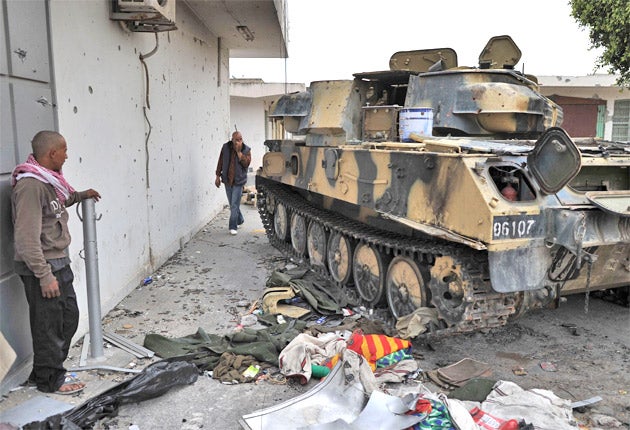We're in Libya for the long haul, Hague warns Cabinet colleagues

David Cameron has raised the prospect of supplying Libyan rebel fighters with lethal weapons as cabinet ministers were warned that Britain and its allies should prepare for the "long haul" in attempts to remove Muammar Gaddafi.
Although the UK Government insisted yesterday that the military action was making progress, initial hopes that the Libyan dictator would be swiftly ousted have been dashed. In Washington, the British and American Defence Secretaries discussed ways of stepping up the pressure on Gaddafi's troops amid signs that they have fought opposition forces to a standstill.
Robert Gates said that Nato was not targeting Gaddafi specifically, after his British counterpart, Liam Fox, had earlier seemed to suggest that such a tactic would be legitimate. Meanwhile the Russian Prime Minister, Vladimir Putin, voiced his disapproval of such a move. "They said they didn't want to kill Gaddafi. Now some officials say, yes, we are trying to kill Gaddafi," Putin said on a visit to Denmark. "Who permitted this, was there any trial? Who took on the right to execute this man, no matter who he is?"
Just over five weeks after the start of the allied military operation, William Hague, the Foreign Secretary, cautioned the Cabinet to prepare for a protracted commitment in Libya.
A Downing Street spokeswoman said: "The general tone was that there were grounds for optimism, good progress was being made, the alliance was holding up very well, but clearly we need to turn up the pressure. The mission is going in the right direction but we need to prepare for the long haul."
Senior MPs queued up in the Commons to demand tougher steps to bring the military action to a conclusion as Mr Hague made a statement to Parliament on the Libyan crisis.
The veteran Tory Bill Cash protested that the policy on arming rebels was "as clear as mud" and disclosed that he had received a letter on the subject from the Prime Minister.
Mr Cameron told him: "We do not rule out supplying lethal equipment. But we have not taken a decision to do so and there remain legal and practical questions." Mr Hague replied that Britain did not regard the ban on supplying arms as absolute, adding: "In certain circumstances, it is legal under the UN resolution to supply equipment to protect civilian life."
The Foreign Secretary insisted the Coalition's resolve was undiminished and added: "Our strategy is to intensify the diplomatic, economic and military pressure on Gaddafi's regime."
Sir Malcolm Rifkind, the former Tory Foreign Secretary, said the Libyan mission could not succeed simply through coalition air power or diplomatic pressure and that further military support needed to be supplied to the opposition.
Bob Ainsworth, the former Labour Defence Secretary, feared Britain was "doing enough to keep this operation going but not enough to bring it to a successful conclusion".
He called for "enough effort now to bring it swiftly to a conclusion and to end the suffering that is taking place".
John Baron, the only Tory to vote against British intervention in Libya, called for a new Commons vote on military action. He accused the Government of allowing mission creep, saying ministers' initial argument had been based on humanitarian protection, but had changed their aims to "accept nothing less than Gaddafi's removal".
In Libya yesterday, forces loyal to Gaddafi renewed their onslaught against Misrata by attacking its only lifeline to the outside world, the port.
The attack gave credence to the suggestion that the Gaddafi loyalists' withdrawal from the city after weeks of fighting was a tactical move rather than forced by any military defeat.
Nato aircraft stymied in their attempts to disrupt the pro-Gaddafi forces around Misrata by their practice of parking vehicles next to buildings and in residential areas, did bomb targets in the city of Khums.
Libyan television also said that foreign ships had successfully severed the al-Alyaf communications cable off the country's coast, cutting Sirte, Ras Lanuf and Brega off from Tripoli.
Join our commenting forum
Join thought-provoking conversations, follow other Independent readers and see their replies
Comments